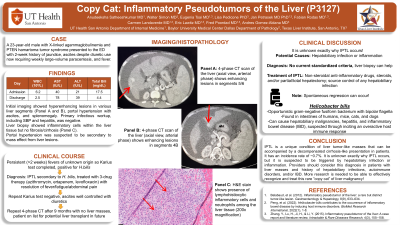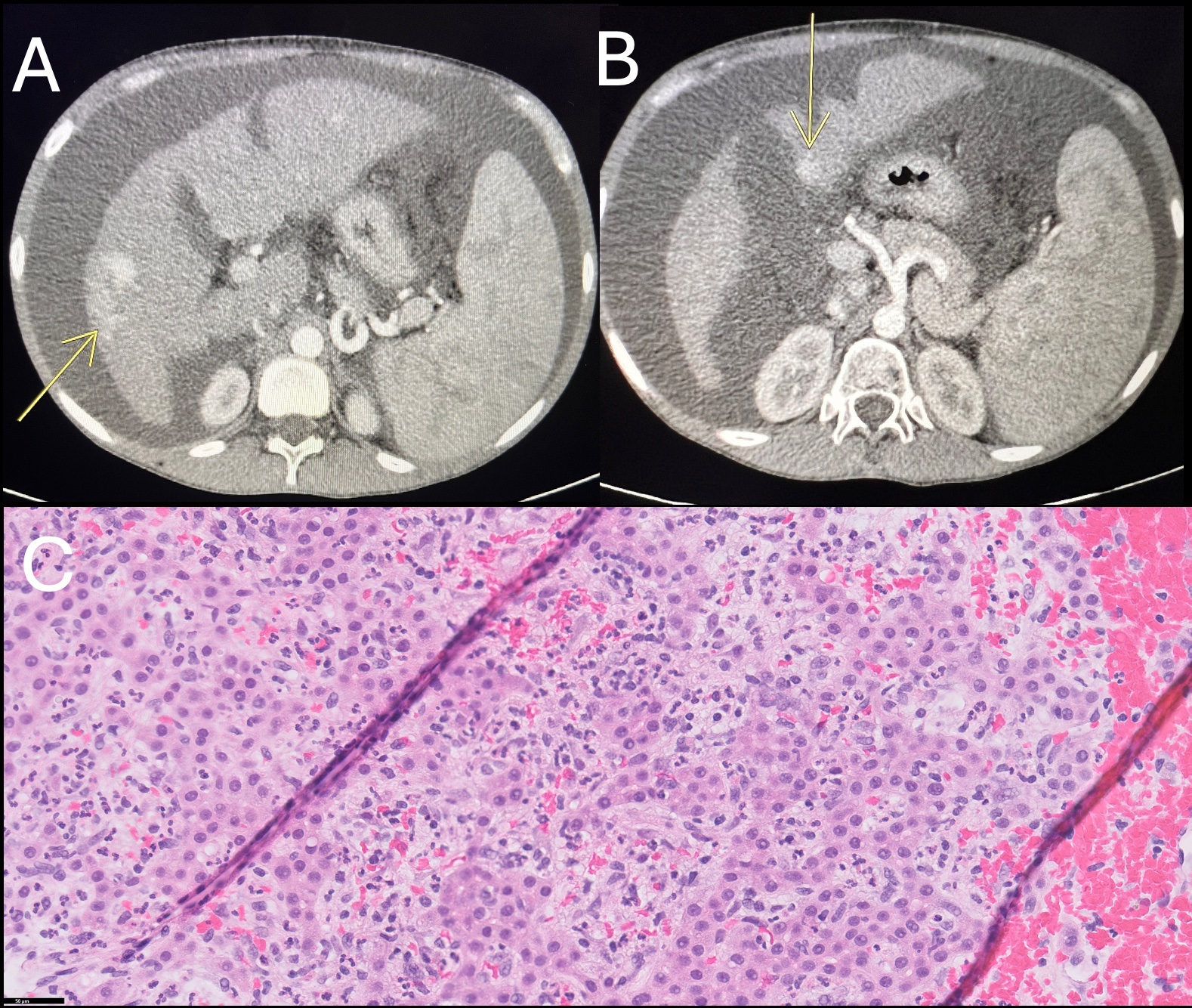Monday Poster Session
Category: Liver
P3127 - Copy Cat: Inflammatory Pseudotumors of the Liver
Monday, October 28, 2024
10:30 AM - 4:00 PM ET
Location: Exhibit Hall E

Has Audio

Anudeeksha Satheeshkumar, MD
University of Texas Health Sciences Center
San Antonio, TX
Presenting Author(s)
Award: Presidential Poster Award
Anudeeksha Satheeshkumar, MD1, Walter Simon, MD, FCAP2, Eugenia Tsai, MD3, Lisa Pedicone, PhD3, Jan Petrasek, MD, PhD3, Fabian Rodas, MD4, Carmen Landaverde, MD5, Eric J. Lawitz, MD6, Fred Poordad, MD3, Andres Gomez-Aldana, MD3
1University of Texas Health Sciences Center, San Antonio, TX; 2PBM Laboratories, Coppell, TX; 3Texas Liver Institute, San Antonio, TX; 4The Texas Liver Institute, San Antonio, TX; 5Texas Liver Institute, Austin, TX; 6The Texas Liver Institute, University of Texas Health, San Antonio, TX
Introduction: Inflammatory pseudotumors of the liver (IPTL) imitate malignancy by manifesting as hepatic masses. We present a rare case of IPTL in a young male after Helicobacter bilis (H. bilis) infection.
Case Description/Methods: A 23-year-old male with X-linked agammaglobulinemia and PTEN hamartoma tumor syndrome presents with jaundice, ascites requiring weekly large-volume paracentesis, and fever. Labs show total bilirubinemia at 17.5 (0.1–1.2 mg/dL), and aspartate and alanine transaminase at 40 (8-33 IU/L) and 21 (29-33 IU/L). Four-phase liver computed tomography (CT) scan shows numerous arterial-enhancing masses (largest up to 6 centimeters), ascites, and splenomegaly suggestive of portal hypertension. The masses are suspected to be regenerative/dysplastic nodules versus hepatocellular carcinoma. A liver biopsy shows lymphohistiocytic inflammatory cells mixed with neutrophils/rare eosinophils, implying a nonspecific panlobular/acinar necroinflammatory process rather than malignancy. Due to the patient’s persistent fevers and no source, Karius test was done and positive for H. bilis, the potential etiology. Patient was diagnosed with IPTL secondary to H. bilis and treated with 3-drug therapy (azithromycin, ertapenem, and levofloxacin) with resolution of fever, fatigue, and abdominal pain. Repeat Karius test was negative and ascites well controlled with diuretics, indicating improvement in portal hypertension after treatment. A follow-up four-phase CT scan nine months later demonstrated no liver masses.
Discussion: It is unknown why IPTL occurs, but hepatobiliary infection and inflammation are considered inciting factors. Liver biopsy supports the final diagnosis as no current standardized diagnostic criteria exist. In this patient, H. bilis was seen with Karius testing and suspected as the cause of his persistent fever. Karius testing uses extracellular DNA fragments released by tissue into the bloodstream to diagnose infections. H. bilis is a gram-negative bacterium that causes many gastrointestinal conditions, such as hepatobiliary malignancies, hepatitis, and inflammatory bowel diseases, by inciting an overactive host immune response. IPTL treatment involves a combination of non-steroidal anti-inflammatory drugs, steroids, and/or partial/total hepatectomy for the inflammatory component. Source control of any hepatobiliary infection should also be pursued. In some cases, the pseudotumors spontaneously regress. More research is needed to understand the risk factors for this alarming cancer “copycat”.

Disclosures:
Anudeeksha Satheeshkumar, MD1, Walter Simon, MD, FCAP2, Eugenia Tsai, MD3, Lisa Pedicone, PhD3, Jan Petrasek, MD, PhD3, Fabian Rodas, MD4, Carmen Landaverde, MD5, Eric J. Lawitz, MD6, Fred Poordad, MD3, Andres Gomez-Aldana, MD3. P3127 - Copy Cat: Inflammatory Pseudotumors of the Liver, ACG 2024 Annual Scientific Meeting Abstracts. Philadelphia, PA: American College of Gastroenterology.
Anudeeksha Satheeshkumar, MD1, Walter Simon, MD, FCAP2, Eugenia Tsai, MD3, Lisa Pedicone, PhD3, Jan Petrasek, MD, PhD3, Fabian Rodas, MD4, Carmen Landaverde, MD5, Eric J. Lawitz, MD6, Fred Poordad, MD3, Andres Gomez-Aldana, MD3
1University of Texas Health Sciences Center, San Antonio, TX; 2PBM Laboratories, Coppell, TX; 3Texas Liver Institute, San Antonio, TX; 4The Texas Liver Institute, San Antonio, TX; 5Texas Liver Institute, Austin, TX; 6The Texas Liver Institute, University of Texas Health, San Antonio, TX
Introduction: Inflammatory pseudotumors of the liver (IPTL) imitate malignancy by manifesting as hepatic masses. We present a rare case of IPTL in a young male after Helicobacter bilis (H. bilis) infection.
Case Description/Methods: A 23-year-old male with X-linked agammaglobulinemia and PTEN hamartoma tumor syndrome presents with jaundice, ascites requiring weekly large-volume paracentesis, and fever. Labs show total bilirubinemia at 17.5 (0.1–1.2 mg/dL), and aspartate and alanine transaminase at 40 (8-33 IU/L) and 21 (29-33 IU/L). Four-phase liver computed tomography (CT) scan shows numerous arterial-enhancing masses (largest up to 6 centimeters), ascites, and splenomegaly suggestive of portal hypertension. The masses are suspected to be regenerative/dysplastic nodules versus hepatocellular carcinoma. A liver biopsy shows lymphohistiocytic inflammatory cells mixed with neutrophils/rare eosinophils, implying a nonspecific panlobular/acinar necroinflammatory process rather than malignancy. Due to the patient’s persistent fevers and no source, Karius test was done and positive for H. bilis, the potential etiology. Patient was diagnosed with IPTL secondary to H. bilis and treated with 3-drug therapy (azithromycin, ertapenem, and levofloxacin) with resolution of fever, fatigue, and abdominal pain. Repeat Karius test was negative and ascites well controlled with diuretics, indicating improvement in portal hypertension after treatment. A follow-up four-phase CT scan nine months later demonstrated no liver masses.
Discussion: It is unknown why IPTL occurs, but hepatobiliary infection and inflammation are considered inciting factors. Liver biopsy supports the final diagnosis as no current standardized diagnostic criteria exist. In this patient, H. bilis was seen with Karius testing and suspected as the cause of his persistent fever. Karius testing uses extracellular DNA fragments released by tissue into the bloodstream to diagnose infections. H. bilis is a gram-negative bacterium that causes many gastrointestinal conditions, such as hepatobiliary malignancies, hepatitis, and inflammatory bowel diseases, by inciting an overactive host immune response. IPTL treatment involves a combination of non-steroidal anti-inflammatory drugs, steroids, and/or partial/total hepatectomy for the inflammatory component. Source control of any hepatobiliary infection should also be pursued. In some cases, the pseudotumors spontaneously regress. More research is needed to understand the risk factors for this alarming cancer “copycat”.

Figure: Panel A: 4 phase CT scan of the liver (axial view, arterial phase) shows enhancing lesions in segments 5/6
Panel B: 4 phase CT scan of the liver (axial view, arterial phase) shows enhancing lesions in segments 4B
Panel C: H&E stain at 200X magnification shows presence of lymphohistiocytic inflammatory cells and neutrophils among liver tissue
Panel B: 4 phase CT scan of the liver (axial view, arterial phase) shows enhancing lesions in segments 4B
Panel C: H&E stain at 200X magnification shows presence of lymphohistiocytic inflammatory cells and neutrophils among liver tissue
Disclosures:
Anudeeksha Satheeshkumar indicated no relevant financial relationships.
Walter Simon indicated no relevant financial relationships.
Eugenia Tsai indicated no relevant financial relationships.
Lisa Pedicone indicated no relevant financial relationships.
Jan Petrasek indicated no relevant financial relationships.
Fabian Rodas indicated no relevant financial relationships.
Carmen Landaverde indicated no relevant financial relationships.
Eric Lawitz: 89Bio – Consultant, Grant/Research Support. Akero – Consultant, Grant/Research Support. Alnylam – Consultant, Grant/Research Support. Amgen – Consultant, Grant/Research Support. AstraZeneca – Consultant, Grant/Research Support. Axcella Health – Consultant, Grant/Research Support. Boehringer Ingelheim – Consultant, Grant/Research Support. Bristol Myers Squibb – Consultant, Grant/Research Support. CymaBay, a Gilead Sciences Company – Consultant, Grant/Research Support. CytoDyn – Consultant, Grant/Research Support. DSM – Consultant, Grant/Research Support. Durect – Consultant, Grant/Research Support. Eli Lilly – Consultant, Grant/Research Support. Enanta – Consultant, Grant/Research Support. Enyo – Consultant, Grant/Research Support. Exalenz – Consultant, Grant/Research Support. Galectin – Consultant, Grant/Research Support. Galmed – Consultant, Grant/Research Support. Genentech – Consultant, Grant/Research Support. Genfit – Consultant, Grant/Research Support. Gilead Sciences, Inc. – Consultant, Grant/Research Support. GSK – Consultant, Grant/Research Support. Hanmi – Consultant, Grant/Research Support. Hightide – Consultant, Grant/Research Support. Intercept – Consultant, Grant/Research Support. Inventiva – Consultant, Grant/Research Support. Ipsen – Consultant, Grant/Research Support. Janssen – Consultant, Grant/Research Support. Madrigal – Consultant, Grant/Research Support. Merck & Co – Consultant, Grant/Research Support. NGM – Consultant, Grant/Research Support. Northsea – Consultant, Grant/Research Support. Novartis – Consultant, Grant/Research Support. Novo Nordisk – Consultant, Grant/Research Support. Pfizer – Consultant, Grant/Research Support. Poxel Co – Consultant, Grant/Research Support. Roche – Consultant, Grant/Research Support. Sagimet – Consultant, Grant/Research Support. Terns – Consultant, Grant/Research Support. Viking – Consultant, Grant/Research Support. Zydus – Consultant, Grant/Research Support.
Fred Poordad indicated no relevant financial relationships.
Andres Gomez-Aldana indicated no relevant financial relationships.
Anudeeksha Satheeshkumar, MD1, Walter Simon, MD, FCAP2, Eugenia Tsai, MD3, Lisa Pedicone, PhD3, Jan Petrasek, MD, PhD3, Fabian Rodas, MD4, Carmen Landaverde, MD5, Eric J. Lawitz, MD6, Fred Poordad, MD3, Andres Gomez-Aldana, MD3. P3127 - Copy Cat: Inflammatory Pseudotumors of the Liver, ACG 2024 Annual Scientific Meeting Abstracts. Philadelphia, PA: American College of Gastroenterology.

